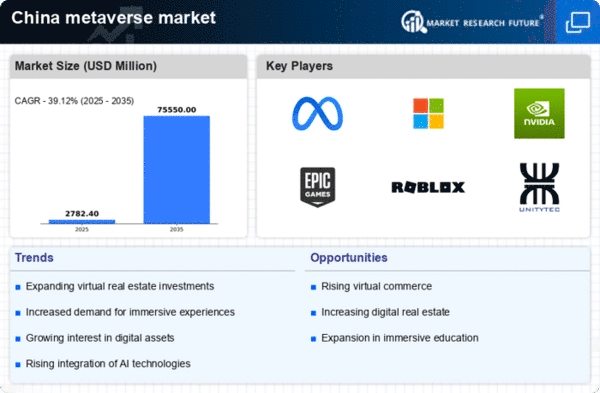Emergence of New Business Models
The metaverse market is witnessing the emergence of innovative business models that are reshaping traditional commerce in China. Companies are exploring virtual real estate, digital goods, and services, creating new revenue streams. The concept of virtual ownership is gaining traction, with users willing to invest in digital assets, as evidenced by the growing market for NFTs. By 2025, the virtual goods market in China is expected to surpass $20 billion, indicating a shift in consumer behavior towards digital consumption. This transformation encourages businesses to adapt their strategies, focusing on creating unique virtual experiences that cater to consumer preferences. As more brands enter the metaverse, competition is likely to intensify, driving further innovation and investment in this burgeoning market.
Expansion of Digital Infrastructure
The rapid expansion of digital infrastructure in China is a crucial driver for the metaverse market. With the government investing heavily in 5G technology and fiber-optic networks, connectivity is becoming increasingly robust. This enhanced infrastructure supports high-speed internet access, which is essential for immersive experiences in the metaverse. As of 2025, it is estimated that over 90% of urban areas in China will have access to 5G networks, facilitating seamless interactions within the metaverse. Furthermore, the proliferation of smart devices is expected to reach 1 billion units, providing users with diverse entry points into the metaverse market. This digital transformation not only enhances user engagement but also attracts businesses looking to establish a presence in this evolving landscape.
Cultural Adoption of Virtual Experiences
Cultural factors significantly influence the growth of the metaverse market in China. The increasing acceptance of virtual experiences, particularly among younger demographics, is driving demand for immersive content. Surveys indicate that approximately 70% of Chinese youth are interested in engaging with virtual environments for entertainment, socializing, and education. This cultural shift is reflected in the rising popularity of virtual concerts, gaming events, and online social platforms. As the metaverse becomes intertwined with daily life, businesses are likely to capitalize on this trend by creating tailored experiences that resonate with local culture. The integration of traditional Chinese elements into virtual spaces may further enhance user engagement, making the metaverse a culturally relevant platform.
Government Support and Policy Frameworks
The Chinese government plays a pivotal role in shaping the metaverse market through supportive policies and initiatives. Recent government strategies emphasize the importance of digital economy development, which includes the metaverse as a key component. By 2025, the government aims to increase the contribution of the digital economy to GDP by 20%, fostering innovation and investment in virtual environments. Additionally, regulatory frameworks are being established to ensure safe and responsible development within the metaverse. This proactive approach encourages both domestic and foreign investments, as companies seek to align with government objectives. The establishment of innovation hubs and funding for startups in the metaverse space further indicates the government's commitment to nurturing this industry.
Advancements in Augmented Reality (AR) and Virtual Reality (VR) Technologies
Technological advancements in AR and VR are driving innovation within the metaverse market. In China, companies are investing heavily in developing cutting-edge AR and VR technologies, which are essential for creating immersive experiences. By 2025, the AR and VR market in China is projected to reach $50 billion, reflecting a compound annual growth rate (CAGR) of over 30%. This growth is fueled by increased consumer demand for interactive content and the integration of these technologies into various sectors, including education, gaming, and retail. As hardware becomes more affordable and accessible, a broader audience is likely to engage with the metaverse, further propelling its growth. The synergy between AR, VR, and the metaverse creates a dynamic ecosystem that enhances user experiences.
















